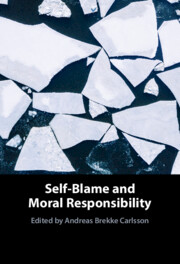Book contents
- Self-Blame and Moral Responsibility
- Self-Blame and Moral Responsibility
- Copyright page
- Contents
- Contributors
- Acknowledgments
- Introduction
- Part I The Nature of Self-Blame
- Part II The Ethics of Self-Blame
- Chapter 5 How Much to Blame?
- Chapter 6 Don’t Suffer in Silence
- Chapter 7 How Should We Feel about Recalcitrant Emotions?
- Part III Self-Blame and Moral Responsibility
- References
- Index
Chapter 7 - How Should We Feel about Recalcitrant Emotions?
from Part II - The Ethics of Self-Blame
Published online by Cambridge University Press: 05 May 2022
- Self-Blame and Moral Responsibility
- Self-Blame and Moral Responsibility
- Copyright page
- Contents
- Contributors
- Acknowledgments
- Introduction
- Part I The Nature of Self-Blame
- Part II The Ethics of Self-Blame
- Chapter 5 How Much to Blame?
- Chapter 6 Don’t Suffer in Silence
- Chapter 7 How Should We Feel about Recalcitrant Emotions?
- Part III Self-Blame and Moral Responsibility
- References
- Index
Summary
In everyday moral experience, we judge ourselves for our emotional responses. Often the emotions that we criticize are recalcitrant: they are emotions that we do not endorse or that conflict with our considered judgments. Most of the philosophical literature on recalcitrant emotions focuses on (a) whether and how they are possible or (b) whether and how they are irrational. In this paper, my interest is in the ways we blame ourselves for recalcitrant emotions. I aim to show that it is harder than it looks to explain self-blame for recalcitrant emotions. I will argue recalcitrance alone does not give us a reason to feel any particular way about our emotions and it is not sufficient grounds for self-blame.
- Type
- Chapter
- Information
- Self-Blame and Moral Responsibility , pp. 134 - 148Publisher: Cambridge University PressPrint publication year: 2022

